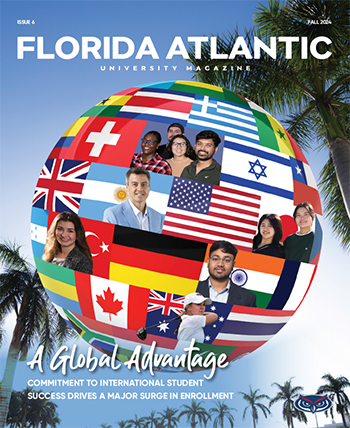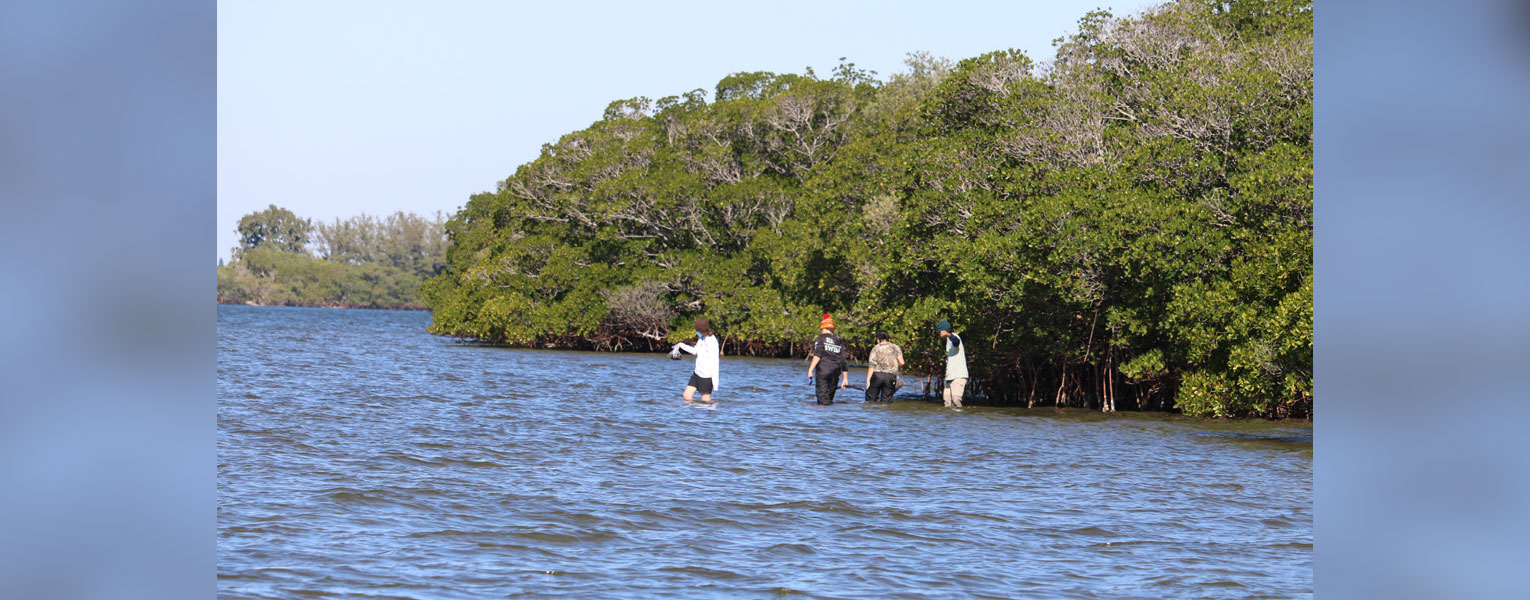5/27/2024
Florida Atlantic: Diving into Marine Science
Semester by the Sea Offers Undergraduates Unforgettable Field Experience
For aspiring marine scientists, the Indian River Lagoon (IRL) offers a treasure trove of learning and research opportunities. And at Florida Atlantic University as undergraduate students, these future scientists are provided a unique opportunity to immerse themselves in this living laboratory which spans 156 miles along Florida’s East Coast.
The Semester by the Sea program was designed by researchers at FAU Harbor Branch Oceanographic Institute, located on a 144-acre campus in Fort Pierce bordering the IRL, one of the most biologically diverse estuaries in North America. The curriculum is a well-rounded, intensive experience for students interested in a career in marine science.
“Semester by the Sea gives students an opportunity to really get in the field – really immerse themselves,” said M. Dennis Hanisak, Ph.D., research professor at Harbor Branch who has led the program – including its initial development – since 2001. “As a student, you get your feet wet, literally, working on projects in and around the Indian River Lagoon.”
The courses are accredited by the Department of Biological Sciences within Florida Atlantic’s Charles E. Schmidt College of Science and are currently supported by a grant from the Harbor Branch Oceanographic Institute Foundation.
Semester by the Sea is conducted during the spring, with capacity capped at 25 students while the final accepted cohort is often smaller. There are currently 14 students in the program who also live on campus at Harbor Branch, adding to the immersive quality of the experience.
The curriculum consists of three core courses: marine science, marine biodiversity and marine ecology. Together, the concepts taught in these courses form a foundation of scientific understanding about the aquatic world.
As Hanisak explained, marine biodiversity answers the question “What do we know about all the different types of organisms in a marine environment?” Marine ecology explores how these organisms interact with the environment, while marine science covers “everything but biology,” which includes the fundamentals of chemical and physical oceanography.
Team teaching is an important aspect of the Semester by the Sea curriculum. Harbor Branch research faculty members are leaders in their fields and step in to teach their areas of expertise within the courses, such as marine plants, corals and invertebrates, and fishes.
The biodiversity and ecology courses each include a lab component, which is where students experience much of the fieldwork central to the program. For instance, during a biodiversity course field day, students towed for phytoplankton samples in the IRL between Vero Beach and Fort Pierce, which they brought back to the lab and analyzed. During an ecology course lab, they studied how bivalves like clams filtered that same kind of phytoplankton and the resulting effect of that filtration on the environment, such as changes in water quality.
The electives offered through the program provide opportunities for students to take advantage of Harbor Branch’s strength in topics like aquaculture research and its proximity to the lagoon.
“Through the aquaculture elective, students get to see something different beyond the more traditional marine biology and marine science disciplines,” Hanisak said. “They can see first-hand some of the areas of specialization they could pursue.”
The Indian River Lagoon Experience elective is a weeklong exploration of the lagoon, where students spend eight-hour days conducting hands-on research activities such as seagrass mapping and quantification of invertebrates. During the course, they are broken into pairs to complete a microstudy. These projects are then developed into posters, which the students present at the end of the semester.
“Semester by the Sea is all about immersion and getting practical experience,” Hanisak said. “In our other courses, the students have to give talks or write papers, so the poster is the third type of scientific communication that is really important for them to master.”
Semester by the Sea adds prestige to a resume, said Annie Page, DVM, Ph.D., associate research professor at Harbor Branch and one of the administrators of the program who sits on its selection committee. “For me, as a professor viewing potential graduate students, seeing Semester by the Sea on their resume tells me they’re academically up to par, and they have a legitimate background in marine studies.”
Many Semester by the Sea students make connections during their time in the program that forge the path for them to earn their master’s and doctoral degrees at Harbor Branch.
“There are similar programs at a few other universities, but as a whole package, Semester by the Sea is a pretty rare opportunity on a national level,” Page said.
Most students who participate in the program already attend Florida Atlantic, but admission is open to any undergraduates who have completed either their second or third year. Both Page and Hanisak cited instances in which students explained that one of their main drivers for attending Florida Atlantic was to be able to participate in Semester by the Sea.
By incorporating career opportunities and navigation into the curriculum, Semester by the Sea students can understand how to turn their passion into a rewarding, lifelong pursuit, said Hanisak.
“What’s really cool is when a student doesn’t have a clue what they want to do, and then through the course of the semester, they latch on to something,” he said. “We see a lot of development over a pretty short period of time.”
Hanisak sees Semester by the Sea as an enrichment opportunity not just for the students, but also for the faculty.
“We are researchers primarily, but most of us feel that part of what we do needs to be shared with the next generation,” he said. “It’s been really gratifying to help students along their path. Florida needs the kind of skillsets that students are learning here.”
If you would like more information, please contact us at dorcommunications@fau.edu.

